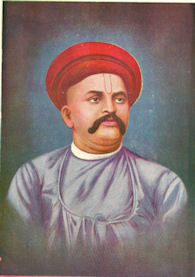

Mit den Auflösungen nach dem "Key" neu herausgegeben von Alois Payer
Zitierweise | cite as:
Apte, Vaman Shivaram <1858 - 1892>: The student's guide to Sanskrit Composition (Being a treatise on Sanskrit Syntax). -- 3. ed. -- 1890. -- 10. Lesson X. -- Fassung vom 2010-02-26. -- URL: http://www.payer.de/apte/apte10.htm
Ursprünglich erschienen als:
Apte, Vaman Shivaram <1858 - 1892>: The student's guide to Sanskrit composition : being a treatise on Sanskrit syntax ; for the use of schools and colleges. -- 3rd ed. -- Poona : R. A. Sagoon, 1890. -- 450 S.
A Key to Apte's Guide to Sanskrit composition : giving a close rendering into English and Sanskrit of all the Sanskrit and English sentences / compiled by an experienced graduate teacher. -- 2d ed. -- Bombay : Standard Pub., 1923. -- 136 p. ; 18 cm
Erstmals hier publiziert: 2010-02-26
Überarbeitungen:
©opyright: Public domain
Dieser Text ist Teil der Abteilung Sanskrit von Tüpfli's Global Village Library
Falls Sie die diakritischen Zeichen nicht dargestellt bekommen, installieren Sie eine Schrift mit Diakritika wie z.B. Tahoma.
Die Devanāgarī-Zeichen sind in Unicode kodiert. Sie benötigen also eine Unicode-Devanāgarī-Schrift.
Use of brackets:
<> = Apte`s own Notes (loc. cit. pp. 277ff.)
[] = A Key to Apte's Guide to Sanskrit composition : giving a close rendering into English and Sanskrit of all the Sanskrit and English sentences / compiled by an experienced graduate teacher. -- 2d ed. -- Bombay : Standard Pub., 1923. -- 136 p. ; 18 cm
{} = Notes by Alois Payer
§ 101. The Genitive case, as observed in Lesson III., is not a Kāraka case, and, strictly speaking, expresses the relation of one noun to an other in a sentence. In the rules given in this Lesson the Genitive has one principal sense, viz. संबन्ध, and even in those cases where verbs are used with the Genitive, it is to be considered as having the sense of relation only. But in several instances this case is used by loose, and not infrequently even classical, authors, to express relations pertaining to other cases; as, तं च व्यसृजद्भरतस्य (Uttararāmacarita 4) 'sent it to Bharata' (भरतस्य being put for भरताय); जयसेनायास्तावत्संवेद्य गच्छ (Mālavikāgnimitra 4) ['Having in the first place informed Jayasenā of it, go.'] for जयसेनायै &c.; स्त्रीणां विश्वासो नैव कर्तव्यः (Hitopadeśa 1) {'One may trust to women'} for स्त्रीषु &c. Such constructions should be considered as deviations from the usual practice, and should not be imitated.
§ 102. Generally speaking, the Genitive case denotes the dependence of a substantive or pronoun upon another word, which is usually a substantive or adjective, but sometimes a verb.
(a) It is thus used to represent 'of' in English; but in several cases compounds are used instead of the Genitive; as, दशरथस्य पुत्रः or दशरथपुत्रः 'the son of Daśaratha.'
Obs. Mark that all the relations expressed by 'of' in English cannot be expressed by the Genitive in Sanskrit; e.g. the adjective meaning and the apposition meaning; as, 'a pot of gold' is generally translated by a compound, हेमपात्रं, or by a derivative, हैमं पात्रं, but not by हेम्नः पात्रं; 'a pot of clay,' मृद्भाण्डं or मृन्मयं भाण्डं; 'a pearl of great price,' महार्घं मुक्ताफलं; 'a man of strength,' सबलो नरः, not बलस्य नरः. Similarly, 'in the month of Vaiśākha,' वैशाखे मासे or वैशाखमासे, but not वैशाखस्य मासे; 'the town of Bombay,' मुंबापुरी or मुंबा नाम पुरी.
So in Latin: 'a man of talent' is 'homo ingeniosus' (धीमान्नरः), not 'homo ingenii'; but 'a man of great talent' is, unlike Sanskrit, 'homo magni ingenii.'
§ 103. The Genitive denotes the possessor, or the person or thing whereto anything belongs, that which belongs, or is possessed, being put in the Nominative case; as, यस्य नास्ति स्वयं प्रज्ञा (Pańcatantra I.) 'he who himself possesses or has no talent'; इमे नो गृहाः (Mṛcchakaṭika I) 'this is our house'; 'to err belongs to men' स्खलनं मनुष्याणां धर्मः.
Obs. This sense is often expressed by derivatives; as, पैतृकं रिक्थं 'property belonging to ancestors'; so अस्मदीयं गृहं {'our house'} &c.

Abb.: इदं नो गृहं अस्मदीयं गृहं वा
[Source: A. Payer, 2010. --
Creative Commons
License (attribution, no commercial use, share alike)]
§ 104. The Genitive is used with substantives, and words used substantively, to denote the whole of which a part is taken, and it is then called 'partitive Genitive '; as, जलस्य बिन्दुः 'a drop of water'; अयुतं शरदां ययौ (Raghuvaṃśa X.1) 'ten thousand years passed'; so, गवां शतसहस्राणि 'thousands of cows.'
So in Latin: 'Mille hominum valentium', 'a thousand of strong men.'
(a) The Partitive Genitive is also found used with ordinals and pronouns or adjectives implying a number ; as, त्वमेव कल्याणि तयोस्तृतीया (Raghuvaṃśa VI.39) 'blessed girl, you alone are their third'; गृह्यतामनयोरन्यतरा (Mālavikāgnimitra 5) 'let one of the two be accepted'; तासामन्यतमा (Mālatīmādhava 5) 'one of those (girls).'
Compare Latin: 'primi juvenum,' {'the firsts of the juvenils'} and 'consulum alter.' {'the other consul'}
(b) The Partitive Genitive is likewise used with superlatives and words having the force of superlatives; as, द्विजानां ब्राह्मणः श्रेष्ठः {'among the twice-borne the Brāhmaṇa is the best'}; धौरेयः साहसिकानामग्रणीर्विदग्धानां (Kādambarī 5) 'the foremost among the bold, and among the clever.'
Obs. This use of the Genitive is already considered in § 89.
So in Latin: 'Maximi principum' 'greatest of princes'; 'oratorum praestantissimi ' 'the most eminent of orators.'
(c) Sometimes मध्ये is used with the Genitive in the sense of 'of ' or 'among '; as, एतेषां मध्ये केचिदरेः कोषदण्डाभ्यामर्थिनः (Mudrārākṣasa 5) 'of these some are desirous of the treasure and army of the enemy.'
§ 105. When a certain period is represented to have elapsed after the occurence of an action, the word expressing the occurrence is put in the Genitive case; as अद्य दशमो मासस्तातस्योपरतस्य (Mudrārākṣasa 6) 'it is today ten months since the dead of my father'; कतिपये संवत्सरास्तस्य तपस्तप्यमानस्य (Uttararāmacarita 4) 'several years have elapsed since he began to practice penance.'
§ 106. Words having the sense of 'dear to' or the reverse, are used with this case; as, प्रकृत्यैव प्रिया सीता रामस्यासीत् (Uttararāmacarita 6) 'Sītā was by her very nature dear to Rāma'; कायः कस्य न वल्लभः (Pańcatantra I.) 'to whom is the body not dear?'
(a) This case also occurs in the construction of words signifying 'difference', such as, विशेषः, अन्तरं; as, एतावानेवायुष्मतः शतक्रतोश्च विशेषः (Śakuntalā 7) 'this is the only difference between the long-lived one (you) and Indra'; अत्रभवतो मम च समुद्रपल्वलयोरिवान्तरं (Mālavikāgnimitra 1) 'there is as much difference between this worthy person and myself as between the sea and a puddle.'
§ 107.1 In the case of potential passive participles, the agent of the action is put in the Genitive or Instrumental case; as, नास्त्यसाध्यं नाम मनोभुवः (Kādambarī 157) 'indeed there is nothing that cannot be accomplished by the mind-born (Cupid)'; so न वयमनुग्राह्याः प्रायो देवतानां (Kādambarī 61) ['Probably we do not deserve to be or are not fit to be favoured by the deities']; न वञ्चनीयाः प्रभवो ऽनुजीविभिः (Kirātārjunīya I.4) ['servants ought not to deceive or mislead their masters']; राक्षसेन्द्रस्य संरक्ष्यं मया लव्यमिदं वनं (Bhaṭṭikāvya VIII.129) 'this forest, fit to be preserved by the lord of the demons, must be cut down by me.'
1 कृत्यानां कर्तरि वा । (Pāṇini II.3.71) {'The sixth case-affix is optionally employed in denoting the agent (but not the object), when the word is governed by a Future Passive Participle (kṛtya).' Transl. Vasu, 1891}
§ 108.1 With words meanik 'cause', 'sake', 'reason', the Genitive is used; as, अल्पस्य हेतोर्बहु हातुमिच्छन् (Raghvaṃśa II.47) 'wishing to give up (lose) much for the sake of little'; विस्मृतं कस्य हेतोः (Mudrārākṣasa 1) 'for what reason is it forgotten?'
1 षष्ठी हेतुप्रयोगे । (Pāṇini II.3.26) {'The sixth case-affix is employed after a noun implying the cause of an action, when the word hetu is used along with such a word.' Transl. Vasu, 1891}
Obs. Patańjali says that the words meaning 'cause', 'reason,' such as निमित्त, कारण, हेतु may be used in this sense in any case in agreement with pronouns. But this is not universally supported by the use of classical authors. केन निमित्तेन - कारणेन - हेतुना and कस्मान्निमित्तात् - कारणात् - हेतोः, are the usual constructions in this sense. We do not say को हेतुः वससि or कं हेतुं वससि in the same sense, nor even कस्मै हेतवे वससि which means 'for what object (purpose) in view do you dwell?' किंनिमित्तं - प्रयोजनं - कारणं - अर्थं is, however, not uncommon. Patańjali's rule must, therefore, be understood in a restricted sense.
§ 109.1 With nouns derived from roots by Kṛt affixes, such as ति, तृ, अ, अन &c., the Genitive is used in the sense of the agent and object of the action denoted by the nouns; in other words, the Genitive in Sanskrit is both subjective and objective; as, क्रियामिमां कालिदासस्य (Vikramorvaśīya 1) 'this composition of Kālidāsa'; भर्तुः प्रणाशात् (Raghuvaṃśa XIV.1) 'on account of the death of their lord'; शास्त्राणां परिचयः (Kādambarī 18) 'the knowledge of Śāstras'; आहर्ता क्रतूनां (Kādambarī 5) 'the performer of sacrifices'; दुःखायेदानीं रामस्य सुहृदां दर्शनं (Uttararāmacarita 3) 'Rāma's seeing his friends now only contributes to (produce) sorrow'.
1 कर्तृकर्मणोः कृति । (Pāṇini II.3.65) ['The sixth case-affix is employed after a word, in denoting the agent and the object, when used along with a word ending with a kṛt-affix (III.1.93).' Transl. Vasu, 1891]
Obs. In the case of verbs governing two objects, the secondary object is put in the Genitive or Accusative; as, नेता अश्वस्य स्रुघ्नं स्रुघ्नस्य वा (Mahābhāṣya) 'the taker of the horse to Srughna'. This construction, however, is very rare; the Genitive is more generally used with both object (principal and secondary); गवां दुग्धस्य दोहनं {'milking cow's milk'}, सागरस्यामृतस्य मन्थनं {'churning of Amṛta from the ocean'}, where the first Genitive has the sense of the Ablative.
§ 110.1 When the agent and object of the action denoted by the nouns formed by Kṛt affixes are both used in a sentence, the object is put in the Genitive case, and not the agent; as, आश्चर्यं गवां दोहो ऽगोपेन (Siddhāntakaumudī) 'the milking of cows without a cowherd is a wonder.'
1 उभयप्राप्तौ कर्मणि । (Pāṇini II.3.66) {'When the agent and the object of the action denoted by the words formed by kṛt-affixes, are both used in a sentence, in the object only, the sixth case-affix is employed, and not in the agent (the object is put in the Genitive case and not the agent).' Transl. Vasu, 1891}
(a)1 When the agent and object are both used, the agent is put in the Instrumental or Genitive case, when, as some say, the Kṛt terminations are of feminine gender, or, as others say, when the terminations are of any gender; as, विचित्रा जगतः कृतिर्हरेर्हरिन वा (Siddhāntakaumudī) 'the creation of the world by Hari is wonderful;' शब्दानामनुशासनमाचार्येण आचार्यस्य वा (Siddhāntakaumudī) ['exposition of the rules of grammar by the teacher']; so, शोभना खलु पाणिनेः (or पाणिनिना) सूत्रस्य कृतिः (Mahābhāṣya) {'beautiful is indeed the composition of the Sūtra by Pāṇini'}.
1 शेषे विभाषा । स्त्रीप्रत्यय इत्येके । केचिदविशेषेण विभाषामिच्छन्ति । (Vārtika)
§ 111.1 The words आयुष्यम्, मद्रं, भद्रं, कुशलं, सुखं अर्थः, and हितं, govern the Dative or Genitive case, when a blessing is intended; as, कृष्णस्य - कृष्णाय - कुशलम्, हितं, भद्रं भूयात् (Siddhāntakaumudī) 'may happiness or good luck attend Kṛṣṇa.'
1 चतुर्थी चाशिष्यायुष्यमद्रभद्रकुशलसुखार्थहितैः । (Pāṇini II.3.73) {'The fourth as well the sixth case-affix may be employed, when blessing is intended in connection with the words āyuṣya 'long life', madra 'joy', bhadra 'good fortune', kuśala 'welfare', sukha 'happiness', artha 'prosperity', and hita 'good'. Transl. Vasu, 1891}
§ 112.1 Words ending in तस् showing direction and other words such as उपरि, अधः, पुरः, पश्चात्, अग्रे, पुरस्तात् &c. having the same meaning as those ending in तस्, govern the Genitive of that with reference to which the direction is shown; as, ग्रामस्य दक्षिणतः - उत्तरतः (Siddhāntakaumudī) 'to the south or north of the village'; गतं उपरि घनानां (Śakuntalā 7) 'going bove dthe clouds'; तरूणामधः (Śakuntalā 1) 'under the trees'; तिष्ठन्भाति पितुः पुरो भुवि यथा (Nāgānanda 1) ' as one shines standing on the ground before his father;' यः पुरस्ताद्यतीनां (Mālavikāgnimitra 1) 'who is foremost among (is at the head of) ascetics.'
1 षष्ठ्यतसर्थप्रत्ययेन । (Pāṇini II.3.30) {'The sixth case-affix is employed when used in connection with words ending with affixes having the sense of the affix atasuc (V.3.28).' Transl. Vasu, 1891}
Obs. उपरि is often joined in a compound; as प्रत्यारोपय रथोपरि राजपुत्रं (Uttararāmacarita 5); चाणक्योपरि प्रद्वेषपक्षपातः (Mudrārākṣasa 3).
(a)1 Words expressive of 'direction' ending in एन such as दक्षिणेन, उत्तरेण &c., govern the Genitive or Accusative of the place with respect to which the direction is shown; as दक्षिणेन तु श्वेतस्य निषधस्योत्तरेण तु (Mahābhārata VI.8.2) ' to the south of Śveta and to the north of Niṣadha'; दकिṇएन वृक्षवाटिकां (Śakuntalā 1) 'to the south of the grove of tress'; धनपतिगृहानुत्तरेण (Meghadūta 78) 'to the north of the house of Kubera.'
1 एनपा द्वितीया । (Pāṇini II.3.31) {'With a word ending with the affix enap (V.3.35), the second case-affix is employed as well as the sixth.' Transl. Vasu, 1891}
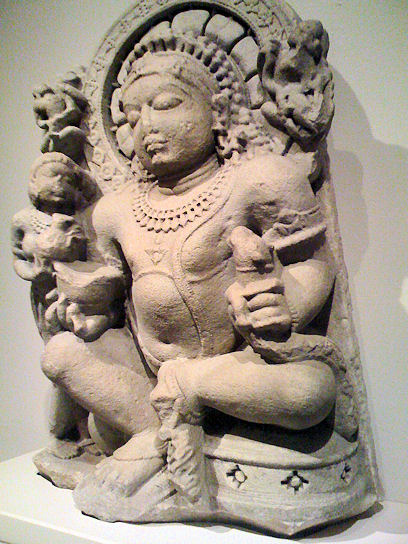
Abb.: धनपतिः
Kubera. Northern India. 10th century. Sandstone. San Antonio Museum of Art
[Source: Zereshk / Wikipedia. -- GNU FDLicense]
(b)1 Words having the sense of दूर 'distant', and अन्तिक 'near' govern either the Genitive or Ablative; as, ग्रामात् ग्रामस्य वा वनं दूरं - निकटं - समीपं &c. (Siddhāntakaumudī) 'the forest is distant from or near the village.'
1 दुरान्तिकार्थैः षाष्ठ्यन्तरस्याम् । (Pāṇini II.3.34) {'When in conjunction with words having the sense of dūra 'distant' and antika 'near', the sixth case-affix is optionally employed.' Transl. Vasu, 1891}
Obs. The Genitive, however, is more generally used; as, तस्याश्रमपदस्य नातिदूरे (Kādambarī 22); अतः समीपे परिणेतुरिस्यते (Śakuntalā 5) ['hence a woman is desired to be near (in the house of) her husband']; प्रयामि तस्याः शकाशं (Kādambarī 158) &c.
§ 113.1 Verbs implying 'to be master of', 'to rule' like ईश्, भू with प्र, दय 'to pity', 'to have compassion on,' and words implying 'remembering' (with regret), 'to think of' like स्मृ, इ with अधि, govern the object of these actions in the Genitive case; as ननु प्रभवत्यार्यः शिष्यजनस्य (Mālavikāgnimitra 1) 'why, your honour has mastery over your pupils'; प्रभवति निजस्य कन्यकाजनस्य महाराजः (Mālatīmādhava 4); यदि प्रभविष्यामि आत्मनः (Śakuntalā 1); नायं गात्राणामीष्टे (Kādambarī 312) 'he cannot rule (control) his limbs'; रामस्य दयमानो ऽसावध्येति तव लक्ष्मणः (Bhaṭṭikāvya VIII.119) 'Lakṣmaṇa taking pity on Rāma, remembers (thinks of) you'; स्मर्तुं दिशन्ति न दिवः सुरसुंदरीभ्यः (Kirātārjunīya V.28) 'do not persuade the heavenly nymphs to think of heaven'; अस्मार्षिज्जलनिधिमंथनस्य शौरिः (Śiṣupālavadha VIII.64).
1 अधीगर्थदयेषां कर्माणि । (Pāṇini II.3.52) {'Of the verbs having the sense of 'remembering,' (adhik) and of daya 'to give,' 'to pity' 'to protect,' 'to move,' and of īśa 'to rule or be master of,' the object takes the sixth case-affix.'}
So in Latin: animus meminit praeteritorum {'the mind remebered the past'}; o virgo miserere mei {Virgin, have mercy upon me'}.
Obs. (a) भू with प्र in the sense of 'to be able' is used with the infinitive (see the Lesson XVI.), and in the sense of to be 'sufficient for' governs the Dative; see § 67 (a).
(b) स्मृ in the ordinary sense of 'remembering' is used with the Accusative; as, स्मरसि तान्यहानि स्मरसि गोदावरीं वा (Uttararāmacarita 1) {'Do you remember those days or do you remember the Godāvarī'}. In this case the object is intended to be used (यदा कर्म विवक्षितं भवति तदा षष्ठी न भवति Mahābhāṣya).

Abb.:
स्मरसि गोदावरीम्
Papikonda (పాపీకోండా),
Andhra Pradesh (ఆంధ్ర
ప్రదేశ్)
[Source: Sreerambh / Wikimedia commons. -- GNU FDLicense]
(c) Adjectives signifying 'conscious' or 'knowing', 'mindful', and their opposites, govern the Genitive of the object; as अनभिज्ञो गुणानां यः स भृट्यैर्नानुगम्यते (Pańcatantra I.1) 'he who is not mindful o0f merits (does not appreciate merits) is not followed by his servants'; so, अनभ्यंतरे आवां मदनगतस्य वृत्तान्तस्य (Śakuntalā 3) ['We two are ignorant of love-matters']. The Locative also is sometimes used; as, यदि त्वमीदृशः कथायामभिज्ञः (Uttararāmacarita 4) ['If you are so well-versed in the story']; तत्राप्यभिज्ञो जनः (Uttararāmacarita 5) ['Even that the people know very well'].
§ 114.1 Words showing 'so many times' or the numeral adverbs of frequency, such as द्विः, त्रिः, अष्टकृत्वः, शतकृत्वः &c., govern the Genitive of time in the sense of the Locative; as, द्विरह्नो भोजनं (Siddhāntakaumudī) 'taking meals twice (in) a day'; शतकृत्वस्तवैकस्याः स्मरत्यह्नो रघूत्तमः (Bhaṭṭikāvya VIII.112) 'the best of Raghus thinks of you alone a hundred times a day.'
1 कृट्वो ऽर्थप्रयोगे काले ऽधिकरणे । (Pāṇini II.3.64) {'The sixth case-affix is employed in denoting location (adhikaraṇa) after a word denoting time (kāla) when used along with a word ending with an affix having the sense of krtvasuc (V.4.17) 'so many times.' Transl. Vasu, 1891}
§ 115.1 Past participles in त are used with the Genitive, when they are used in the sense of the present tense; as, अहमेव मतो महीपतेः (Raghuvaṃśa VIII.8) 'I alone am regarded by the king'; विदितं तप्यमानं च तेन मे भुवनत्रयं (Raghuvaṃśa X.39) 'I know that the three worlds are being tormented by him'; राज्ञां पूजितः (Siddhāntakaumudī) 'is honoured by kings.'
1 क्तस्य च वर्तमाने । (Pāṇini II.3.67) {'The past participle ending in क्त when used in the sense of the present tense (III.2.187 and 188), is used with the Genitive.' Transl. Vasu, 1891}
(a) But when past time is meant to be indicated, the Instrumental alone is used; as न खलु विदितास्ते चाणक्यहतकेन (Mudrākākṣasa 2) 'were they not discovered by the wretched Cāṇakya?'
(b) When used as abstract neuter nouns, past participles are, of course, used with the Genitive; as, मयूरस्य नृत्तं (Mahābhāṣya) 'the dancing of a peacock'; कोकिलस्य व्याहृतं ['The utterance of notes of the cuckoo'], नटस्य भुक्त {'the meal of an actor'} ; छात्रस्य हसितं {'the laughing of a pupil'} (ibid.).

Abb.:
मयूरस्य नृत्तम्
[Source: Superborsuk / Wikipedia. --
Public domain]
{कोकिल = Asian Koël = Eudynamys scolopaceus L.
Abb.: कोकिलः = Asian Koël = Eudynamys scolopaceus L., Kolkata (কলকাতা), West Bengal (পশ্চিমবঙ্গ)
[Source: J.M.Garg / Wikipedia. -- GNU FDLicense]}
§ 116. कृते 'for', 'for the sake of,' and समक्षं 'in the presence of,' govern the Genitive; as, अमीषां प्राणानां कृते (Vairāgyaśataka 36) 'for this life'; राज्ञः समक्षमेव (Mālavikāgnimitra 1) 'in the presence of the king himself.'
Obs. कृते is often compounded with another word; as, कावमर्थकृते (Kāvyaprakāśa 1).
§ 117.1 Words having the sense of 'equal to', 'like', such as तुल्य, सदृश, सम, सकाश &c., govern the Genitive or Instrumental of that with which any object is compared; as कृष्णस्य तुल्यः - सदृशः &c. (Siddhāntakaumudī). For the Instrumental see § 52 (b).
1 तुल्यार्थैरतुलोपमाभ्यां तृतीयाअन्यतरस्याम् । (Pāṇini II.3.72) {'The third or sixth case-affix may optionally be employed, when the word is joined with another word meaning 'like to, or resemblance'; except तुला and उपमा. Transl. Vasu, 1891}
Obs. Pāṇini says that the words तुला and उपमा cannot be used with Instrumental. But this is against good usage; as, तुलां यदारोहति दंतवाससा (Kumārasambhava V.34) ['Which attains equality - resembles your lip']; नभसा तुलां समारुरोह (Raghuvaṃśa VIII.15); स्फुटोपमं भूतिसितेन शंभुना (Śiṣupālavadha I.4) ['Clearly (prominently) comparable with Śambhu, white with ashes']. Mallinātha tries to reconcile these instances with Pāṇini's Sūtra; but the defence is evidently lame.

Abb.: स्फुटोपमं भूतिसितेन
शंभुना
Haridwar (हरिद्वार भारत), Uttarakhand
(उत्तराखण्ड)
[Source: Naresh Dhiman. --
http://www.flickr.com/photos/nareshdhiman/311832594/. -- Downloaded on
2010-02-23. --
Creative commons license (attribution)]
(a) Adjectives implying 'worthy of', 'proper', 'befitting', are usually construed with the Genitive; as, सखे पुंडरीक नैतदनुरूपं भवतः (Kādambarī 146) 'friend, Puṇḍarīka, this is not worthy of you'; सदृशमेवैतत्स्नेहस्यानवलेपस्य (Śakuntalā 6) 'this, indeed, befits the prideless love.' See also § 96(a).
§ 118. Nouns ending in तृ are used with the Accusative instead of the Genitive, when 'habit' or 'disposition' is intended to be expressed; as, पितरमाराधयिता भव (Vikramorvaśīya 5) 'always keep thy father pleased'; संभावयिता बुधान्न्यग्भावयिता शत्रून् (Daśakumāracarita II.8) 'whose habitual disposition is to respect the wise and to humble his foes'; but जगतो निर्माता, घटस्य कर्ता, &c.
(a) कृ with अनु 'to imitate', 'resemble', is often found used with the Genitive or Accusative of the object; as, ततो ऽनुरुर्यात्तस्याः स्मितस्य (Kumārasambhava I.44) 'then it might imitate (resemble) her smile;' श्यामतया भगवतो हरेरिवानुकुर्वतीं (Kādambarī 10) 'as if resembling the God Hari in point of sableness'; सर्वाभिरन्याभिः कलाभिरनुचकार तं वैशंपायनः (Kādambarī 75) 'Vaiśampāyana imitated him in all other arts'; so, शैलाधिपस्यानुचकार लक्ष्मीं (Bhaṭṭikāvya II.8) ['imitated the beauty of the lord of mountains (Himālaya)'].
§ 119.1 The roots व्यवहृ and पण् (I Ā) in the sense of 'dealing in transactions', 'staking in gambling', govern the Genitive of the object; as, शतस्य व्यवहरणं - पणनं (Siddhāntakaumudī) 'dealing in hundred' or 'staking hundred'; so, प्राणानामपणिष्टासौ (Bhaṭṭikāvya VIII.121) ['he staked (risked) his life']. But the Accusative is more generally used; so, पणस्व कृष्णां पांचालीं (Mahābhārata II.65.32) ['put to stake Kṛṣṇā (Draupadī, princess of) Pāńcāl country'].
(a) दिव्, when it has the same sense, is similarly used; as, शतस्य दीव्यति (Siddhāntakaumudī); but when it is preceded by a preposition, the Accusative or Genitive may be used; as, शतस्य शतं वा प्रतिदीव्यति (Siddhāntakaumudī).
1 व्यवहृपणोः समर्थयोः । दिवस्तदर्थस्य । विभावोपसर्गे । (Pāṇini II.3.57-59) {'57. The object of the verbs vyavahṛ and paṇ when they are synonymous, that is when they mean 'dealing in sale and purchase transactions' or 'staking in gambling,' takes the sixth case-affix. 58. The object of the verb div when having the above-mentioned sense of 'dealing' or 'staking,' takes the sixth case-affix. 59. The object of the verb div when having the above-mentioned sense of dealing or staking, optionally takes the sixth case-affix, when it is preceded by an upasarga (or preposition).' Transl. Vasu, 1891}
तस्याः पंडितकौशिक्या सहितायाः समक्षमेव न्याय्यो व्यवहारः ॥१॥ (Mālavikāgnimitra 1)
[Key: पण्डिता चासौ कौशिकी च तस्याः ।
Then it is proper that the case should be decided in the presence of her, accompanied by the learned Kauśikī.]
श्वापदानुसरणैर्मम गात्राणामनीशो ऽस्मि संवृत्तः ॥२॥ (Śakuntalā 2)
[Key: श्वापदानामनुसरणानि तैः ।
I am not the master of my senses (have no control over my limbs) on account of my pursuit of the beasts (game).]
कथं मामेकाकिनीं त्यक्त्वार्यपुत्रो गतः । भवतु कोपिष्यामि यदि तं प्रेक्षमाणात्मनः प्रभविष्यामि ॥३॥ (Uttararāmacarita 1)
[Key: How is it that my lord (husband) has gone away leaving me alone? Very well; I shall get angry with him if I can have mastery over myself when I see him (i.e. if my anger does not melt away at his sight).]
अयि भागीरथीप्रसादाद्वनदेवतानामप्यदृश्यासि संवृत्ता ॥४॥ (Uttararāmacarita 3)
[Key: O you, you have become invisible even to the sylvan deities by the favour of Bhāgīrathī.]
{"BHĀGĪRATHĪ. The Ganges. The name is derived from Bhagīratha, a descendant of Sagara, whose austerities induced Śiva to allow the sacred river to descend to the earth for the purpose of bathing the ashes of Sagara's sons, who had been consumed by the wrath of the sage Kapila. Bhagīratha named the river Sagara, and after leading it over the earth to the sea, he conducted it to Patala, where the ashes of his ancestors were laved with its waters and purified."
[Source: Dowson, John <1820-1881>: A classical dictionary of Hindu mythology and religion, geography, history, and literature. -- London, Trübner, 1879. -- s.v. ]}
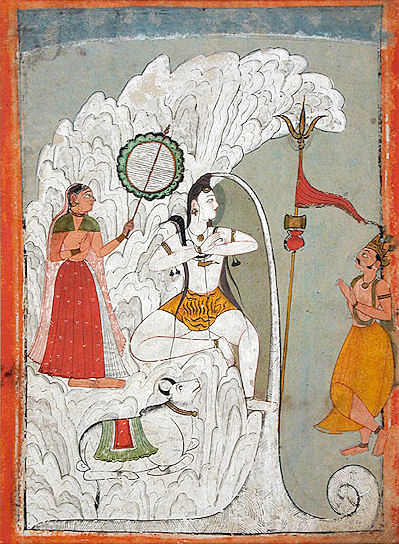
Abb.: Śiva bearing the Descent of the Ganges River, as the
goddess Pārvatī, the sage Bhagīratha, and the bull Nandī look on (circa 1740).
[Source: Redtigerxyz / Wikipedia. -- Public domain]

Abb.: भागीरथी
गंगोत्री,
उत्तराखण्ड
[Source: Atarax42 / Wikipedia. -- GNU
FDLicense]
हा देवि स्मरसि वा तस्य प्रदेशस्य तत्समयविश्रंभातिशयप्रसंगसाक्षिणः ॥५॥ (Uttararāmacarita 6)
<Notes: विश्रंभातिशयप्रसंगसाक्षिणः 'bearing testimony to the occurrences (incidents) of much familiarity' between us two.>
[Key: स समयस्तत्समयः, विश्रम्भस्यातिशयाः विश्रम्भातिशयाः तेषां प्रसंगास्तेषां साक्षिणः ।
Ah queen, dost thou remember that region, the witness of the occasions of our great familiarity?]
एवमवस्थिते यदत्रावसरप्राप्तमीदृशस्य चानुरागस्य सदृशनस्मदागमनस्य चानुरूपमातम्नो वा समुचितं तत्र प्रभवति देवीत्यभिधाय मन्मुखासक्तदृष्टिः कपिञ्जलस्तूष्णीमासीत् ॥६॥ (Kādambarī 158)
<Notes: एवमवस्थिते 'under these circumstances.' तत्र प्रभवति देवी 'your ladyship has full power to do that' etc.>
[Key: अवसरः प्रप्तो ऽस्य तत् । रूपस्य योग्यमनुरूपम् । मम मुखम्मन्मुखं, मन्मुखे आसक्ता दृष्टिर्यस्य ।
Such being the case or under these circumstances your ladyship has the power (it depends upon your discretion) to do that which the time requires, which befits such love, which is worthy of my coming here and which is proper for you to do - with these words Kapińjala resumed silence, his eyes fixed on my face.]
धिङ् मां दुष्कृतकारिणीं यस्याः कृते तवेयमीदृशी दशा वर्तते ॥७॥ (Kādambarī 167)
[Key: Fie upon me, the perpetrator of wrong, on whose account such has been your condition.']
हा दयित माधव प्रलोकगतो ऽपि स्मर्तव्यो युष्माभिरयं जनः । न खलु स उपरतो यस्य वल्लभो जनः स्मरति ॥८॥ (Mālatīmādhava 5)
<Notes: अयं जनः i.e. Mālatī. न खलु etc. 'that being is surely not dead, who is remembered by his beloved.'>
[Key: Alas, beloved Mādhava! You should remember this person, although gone to the next world; he is not, indeed, dead whose memory a beloved person cherishes.]
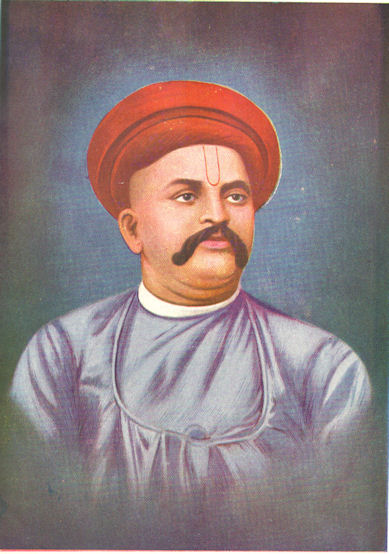
Abb.: न खलु स उपरतो यस्य
वल्लभो जनः स्मरति
वामन शिवराम आपटे (१८५८ - १८९२)
कापि महती वेला वर्तते तवादृष्टस्य । तदनया सहैवागच्छ ॥९॥ (Kādambarī 241)
[Key: For a long time, you have not been seen. So come along with her.]
अहं हि संमतो
रज्ञो य एवं मन्यते कुधीः ।
बलीवर्दः स विज्ञेयो विषाणपरिवर्जितः ॥१०॥ (Pańcatantra I.10)
[Key: कुत्सिता धीर्यस्य । विषाणाभ्यां परिवर्जितः ।
The foolish man who thinks that he is esteemed by (trusts in the favour of) a king should be known (set down) a bull without horns.]

Abb.:
बलीवर्दः स विज्ञेयो विषाणपरिवर्जितः
[Source: Eduarda María Pacheco / Wikimedia
commons. -- GNU FDLicense]
शरीरस्य गुणानां च दूरमत्यन्तमन्तरम्
।
शरीरं क्षणविध्वंसि कल्पान्तस्थायिनो गुणाः ॥११॥ (Hitopadeśa 1)
[Key: Very great is the difference between the body and merits : the body is perishable in a moment while the merits endure to the end of a Kalpa (कल्पान्तं तिष्ठन्तीति).]
अर्थानामीशिषे त्वं वयमपि च गिरामीश्महे यावदर्थम् ॥१२॥ (Vairāgyaśataka III.30)
[Key: Thou art the master of riches; and we too have full command over words.]
समरशिरसि
चञ्चत्पञ्चचूडश्चमूनाम्
उपरि शरतुषारे को ऽप्ययं
वीरपोतः (किरति) ॥१३॥ (Uttararāmacarita 5)
<Notes: समरशिरसि 'in the front of battle,' 'in the thickest of the fight.'>
[Key: समरस्य शिरः समरशिरः तस्मिन् । चञ्चन्त्यः पञ्च चूदा यस्य । शराणां तुषारः तम् । वीरः पोतः वीरपोतः a comp. सुप्सुपा ।
Here is some young warrior, with his five crests fluttering (moving) about, pouring a shower of arrows on the forces in the thickest of the fight.]
स राजा मनसि धर्मेण कोपे यमेन प्रतापे वह्निना मुखे शशिना प्रज्ञायां सुरगुरुणा तेजसि सवित्रा च वसता सर्वदेवमयस्य प्रकटितविश्वरूपाकृतेरनुकरोति भगवतो नारायणस्य ॥१॥ (Kādambarī 6)
<Notes: सर्वदेवमयस्य 'he was like Nārāyaṇa, who represents all gods, because he had the several deities dwelling in himself.' He had Dharma dwelling in his mind, i.e. he was straightforward or righteous as Dharma; etc.>
[Key: प्रकटितानि विश्वानि रूपाणि यया सा प्रकटितरूपा आकृतिर्यस्य ; or प्रकटितरूपा विश्वरूपा आकृतयो येन तस्य ।
The king imitates (resembles) the divine Nārāyaṇa who represents all gods and who has manifested multifarious forms (or forms of various kinds) inasmuch as Dharma dwells in his mind, Yama in his anger, fire {Agni} in his exploit (or glory), the moon {Candra} in his face, the preceptor of gods {Bṛhaspati} in his intellect and the sun {Savitṛ} in his fiery energy (majesty); i.e. the king was pious in his mind, as terrible as Yama when angry, &c. &c.]
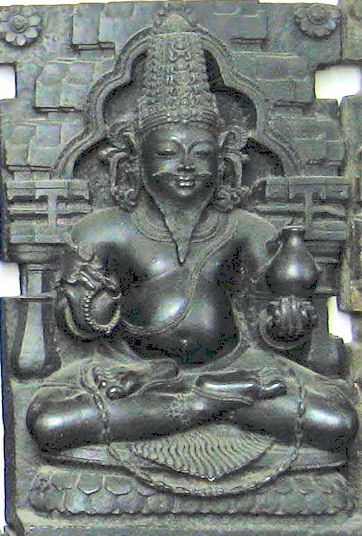
Abb.: देवगुरुर्बृहस्पतिः
Konark (6କଣାର୍କ), Orissa (ଓଡ଼ିଶା),
13. century
[Source: Redtigerxyz / Wikipedia. -- GNU FDLicense]
नियतमिह सर्वात्मना कृतावस्थितिना भगवता परिभूतकलिकालविलसितेना धर्मेण न स्मर्यते कृतयुगस्य ॥२॥ (Kādambarī 44)
<Notes: Certainly Dharma staying here in his entirety, setting at naught the sports of the Kali age (not being influenced by its effects) does not think of the (good old) Kṛta age,' the age proper for Dharma; so good is the life of those who dwell in this hermitage.>
[Key: सर्व आत्मा यस्यासौ सर्वात्मा तेन । कृतावस्थितिर्येन । परिभूतं कलिकालस्य विलसितं येन ।
Certainly Dharma, who dwells in his entirety here, does not remember (with regret) the Kṛta age and who defies the effect of Kaliyuga.]
उदेति पूर्वं कुसुमं ततः फलं
घनोदयः प्राक्तदनन्तरं पयः ।
निमित्तनैमित्तिकयोरयं क्रमस्तव प्रसादस्य पुरस्तु संपदः ॥३॥ (Śakuntalā 7)
<Notes: तव प्रसादस्य etc. 'But with you, the blessings have preceded your favour,' against the general course of cause and effect.>
[Key: घनानामुदयः तस्यानन्तरं तदनन्तरम् । निमित्तं च नैमित्तिकं च तयोः ।
First appears the flower and then the fruit; the clouds rise up first and then follows shower: such is the order of cause and effect; but (in your case) prosperity or good fortune (lit. riches) comes before your favour is shown.]

Abb.: उदेति पूर्वं कुसुमं ततः फलम्
आम्रकुसुमम् (Mango - Mangifera indica)
[Source: dinesh_valke. --
http://www.flickr.com/photos/dinesh_valke/367639315/. -- Downloaded on
2010-02-26. --
Creative
commons license (attribution, no commercial use, no derivatives)]
शंबूको नाम वृषलः पृथिव्यां
तप्यते तपः ।
शीर्षच्छेद्यः स ते राम तं हत्वा जीवय द्विजम् ॥४॥ (Uttararāmacarita 2)
<Notes: शीर्षच्छेद्यः 'to be decapitated.' ते = त्वया.>
[Key: A Vṛṣala (son of a Vaiśya man and a Śūdra woman), Śambūka by name, practices penance on earth; he deserves to be decapitated by you. Kill him and save the Brāhmaṇa.]
"The oldest mention of Shambuka occurs in the Ramayana of Valmiki, in the last book of the epic Uttara-kanda. After Lord Rama returns to Ayodhya and is crowned the king of Ayodhya, the death of a child occurs in the kingdom. He is told that calamities such as this occur when Dharma is not followed in a kingdom. Rama tries to find out the reason and comes to know that a person of the Shudra jati, called Shambuka is performing penance which he is strictly not supposed to do according to the Varna system. He is executed, by beheading, personally by Rama. The place where Shambuka was beheaded is identified as the hill of Ramtek, near Nagpur in Maharashtra."
[Source: http://en.wikipedia.org/wiki/Shambuka. -- Accessed on 2010-02-25]
अपीप्सितं क्षत्रकुलांगनानां
न वीरसूशब्दमकामयेताम् ॥५॥ (Raghuvaṃśa XIV.4)
<Notes: अकामयेतां scil. 'the two mothers, Kauśalyā and Sumitrā.'>
[Key: कुलपालिका अङ्गना कुलाङ्गना - A woman who maintains the honour of the family. क्षत्रस्यांगनाः तासाम् । वीरं सूते असौ वीरसूः; वीरसूरिति शब्दः तम् ।
They (two) did not desire the title of 'the generator of a hero' though much coveted by Kṣatriya ladies of family.']
{Kauśalyā: wife of Daśaratha and mother of Rāma; Sumitrā: wife of Daśaratha and mother of Lakṣmaṇa and Śatrughna.}
वाच्यस्त्वया मद्वचनात्स राजा
वह्नौ विशुद्धामपि यत्समक्षम् ।
मां लोकवादश्रवणादहासीः श्रुतस्य किं तत्सदृशं कुलस्य ॥६॥ (Raghuvaṃśa XIV.61)
<Notes: Said by Sītā to Lakṣmaṇa when she was ruthlessly abandoned. मद्वचनात् 'in my name.'>
[Key: मम वचनं मद्वचन; तस्मात् । लोकस्य वादः लोकवादः तस्य श्रवणं तस्मात् ।
That king should thus be addressed in my name - You abandoned me though I was proved to be pure by the fiery ordeal in your presence, by hearing the scandalous talk of the people - was that worthy of your family or of your learning (or श्रुतस्य कुलस्य worthy of your illustrious family)?]
देव्या शून्यस्य जगतो द्वादशः
परिवत्सरः ।
प्रनष्टमिव नामापि न च रामो न जीवति ॥७॥ (Uttararāmacarita 3)
<Notes: द्वादशः परिवत्सरः 'it is now 12 years since the world was made destitute of the queen.'>
[Key: This the twelfth year since the world became destitute of the queen; her name, too, seems to be forgotten; and yet it is not that Rāma does not live.]
अये मैथिल्यभिज्ञानं
काकुत्स्थस्यांगुलीयकः ।
भवत्याः स्मरतात्यर्थमर्पितः सादरं मम ॥८॥ (Bhaṭṭikāvya VIII.118)
<Notes: मैथिल्यभिज्ञानं = मैथिलि अभिज्ञानं.>
[Key: O princess of Mithilā, this finger-ring of the descendent of Kākutstha (Rāma), which is to serve as a token of recognition, was given me in great earnest by him who remembers your ladyship constantly (or very much).]
पुरः प्रवेशमाश्चर्यं बुद्ध्वा
शाखामृगेण सा ।
चूडामणिमभिज्ञानं ददौ रामस्य संमतम् ॥
रामस्य शयितं भुंक्ते जल्पितं हसितं स्थितम् ।
प्रक्रान्तं च मुहुः पृष्ट्वा हनुमन्तं व्यसर्जयत् ॥९॥ (Bhaṭṭikāvya VIII.124-5)
<Notes: सा = सीता. पुरः etc. 'Knowing the entry of the monkey into the (impregnable) city of Laṅkā to be a miraculous occurrence.'>
[Key: शाखायां मृग इव शाखामृगः ।
Knowing (feeling) the entrance into the city by a monkey to be a wonder, gave him her crest-jewel that was highly prized by Rāma, as a token of recognition. She dismissed Hanumat after asking him again how Rāma slept, what he ate, what was his talk, if he smiled, how he lived and what he was about.]
तं
दृष्ट्वाचिन्तयत्सीता हेतोः कस्यैष रावणः ।
अवरुह्य तरोरारादैति वानरविग्रहः ॥
उत्तराहि वसन्रामः समुद्राद्रक्षसां पुरम् ।
अवैल्लवणतोयस्य स्थितां दक्षिणतः कथम् ॥१०॥ (Bhaṭṭikāvya VIII.104,107)
<Notes: Reflections of Sītā, at her first seeing Māruti alighting in the garden. She first believed him to be Rāvaṇa; verse 107 states why she does not believe that the person had been sent by Rāma. 'Dwelling to the north of this sea, how could Rāma know this city situated to the south of the salt ocean?'>
[Key: Seeing him Sītā thought to herself - "With what object in view does this Rāvaṇa, in the form of a monkey, descend from a tree and approach me? How could Rāma, living to the north of the sea, know of the city of the Rākṣasas that lies to the south of the salt sea?" (लवणं तोयं यस्य)]
{अवैत् + लवणतोयस्य ; अवैत् = Impf. 3. sg. इ + अव}
All translations from the Key.
1. The women looking intently on the young man could, with great difficulty, control (ईश्) themselves.
तं युवानं सोत्कण्ठं or एकामत्या पश्यन्त्यः (or नयनैः पिबन्त्यः) अंगनाः कथंचिन्मनसः or आत्मन ईशा बभुवुः ॥१॥
2. What difference is there between men and beasts if the former imitate (कृ with अनु) the latter in their actions?
यदि नराः कर्मभिः पशूनामनुकुर्युस्तर्हि तेषां तेषां च को विशेषः ॥२॥
3. Friend, do not despair; she, for (कृते) whom you are so much afflicted, will herself come to you.
मित्र मा नैराश्यं गमः or वैक्लव्यं गच्छ or विक्लवीभव । यस्याः कृते त्वमेवं पर्याकुलः - पर्युत्सुकः - असि or उत्ताम्यसि साचिरात्त्वामुपैष्यति ॥३॥
4. There is no pleasure equal to (तुल्य) that enjoyed by those who, devolving their household duties upon their sons, reside in forests.
ये पुत्रेषु गृहकार्यभारं निक्षिप्यारण्यमधिवसन्ति तैरनुभूतस्य सुखस्य तुल्यं नास्ति ॥४॥
5. Is this your act suitable to the dignity of the high family in which you are born?
एतत्तव कृत्यं यस्मिन्नुच्चकुले त्वमुत्पन्नस्तस्य सदृशं किम् ॥५॥
6. The order of my elders will only have power (भू with प्र) over my body, but not over my mind and its workings.
प्रभवति मम शरीरस्य गुरुजनानामाज्ञा न तु मन् मनसस्तस्य वृत्तीनां - व्यापाराणां वा ॥६॥
7. The child, being long kept away (दूर) from its mother, remembers (स्मृ) her often and often.
चिरं मातुर्दूरं स्थापितः or वासितो बालस्तस्या वारं वारं स्मरति ॥७॥
8. To the north (उत्तरतः) of this mountain is an extensive plain, covered all over with verdant grass, which almost enchants the beholder's eye.
अस्य पर्वतस्योत्तरतः सर्वतो हरिततृणाच्छादितो विस्तीर्णः समभू्प्रदेशो ऽस्ति यः प्रेक्षितुर्मनो हरति or विलोमयतीव ॥८॥
9. The story, which the attendant narrated to the king in the presence of (समक्षं) all his ministers, went home to his heart.
भृत्यः सर्वेषां प्रकृतीनां or सचिवानां समक्षं यां कथां रज्ञे ऽकथयत् or आवेदयत्सा तस्य हृदयमर्माण्यस्पृशत् or भृत्येनावेद्यमाना कथा &c. ॥९॥
10. Here I see before (पुरः) me a large heap of bones; there a number of bits of flesh under (अधः) the trees. What may it be?
इहो ऽहं मम पुरो ऽस्थ्नां महान्तं राशिं पश्यामि । ततो वृक्षाणामधः कतिपयानि मांसखण्डानि । किमेतत्स्यात् or किम्नन्वेतत् ॥१०॥
11. In the reign of Suṣeṇa every one out of his subjects thought that he was respected (पूज्) and liked (मन्) by the king.
सुषेणे राजनि or महीं शासति प्रजानां मध्ये सर्वो ऽपि अहमेव महीपतेर्मतः पूजितश्चेत्यमंस्त or अचिन्तयत् ॥११॥
12. Be thou worthy of thy father by reason of thy qualities liked by the people!
भव पितुरनुरूपस्त्वं गुणैर्लोककान्तैः ॥१२॥
13. A long time has elapsed since the venerable lady went to see Mālavikā.
कापि महती वेला or कियानपि कालः तत्रभवत्या मालविकां द्रष्टुं गतायाः ॥१३॥
14. This king is fit to be waited upon (सेव्य) by servants ; and the epithet 'protector of men' quite becomes him.
अयं भूपो भृत्यानां भृत्यैर्वा सेव्यः । अपि च नृपाल इति विशेषणमस्मिन्सर्वथोपपन्नम् ॥१४॥
15. There is nothing in this world like (सदृश) friendship with the good.
सद्भिः सह मैत्र्याः सदृशमस्मिञ्जगति नास्त्यन्यत्कुञ्चित् ॥१५॥
16. Good books are dearer to clever students than fine clothes.
Clever = धीमत्, पटुः. Fine clothes = सुक्ष्मवस्त्रेभ्यः , भासुर - उज्ज्वल - or शोभनवासोभ्यः ।
{धीमतां विद्यार्थिनां कल्याणानि पुस्तकानि सुक्ष्मवस्त्रेभ्यः प्रेयांसि ॥१६॥}

Abb.: धीमतां विद्यार्थिनां कल्याणानि पुस्तकानि सुक्ष्मवस्त्रेभ्यः प्रेयांसि ॥
Alois Payer
[Source: A. Payer, 2010. --
Creative Commons
License (attribution - no commercial - no derivative)
17. A devout Brāhmaṇa should perform his Saṃdhyā adoration twice a day and eat only once in a day before sunset.
धार्मिकः - शीलः or निष्ठः ब्राह्मनो द्विरह्नः सन्ध्यामुपासीत सकृच्च सूर्यास्तात्प्राग्भुञ्जीत ॥१७॥
18. Rāma was dearer to Sītā than her very life.
Easy.
To Lesson XI.